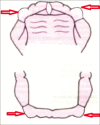A Fatal Case of Infant Oral Mutilation Practice
- PMID: 33967543
- PMCID: PMC8092082
- DOI: 10.4103/ccd.ccd_319_20
A Fatal Case of Infant Oral Mutilation Practice
Abstract
Infant oral mutilation (IOM) is a traditional dental practice where traditional healers enucleate primary canine tooth buds in children in the hope of preventing or curing childhood illness. The method applied is heinous, painful, and carried out in unsterile environment, and this increases the morbidity and mortality of children from the communities where IOM is rife. The case report described here arose from a village, where an infant with a medical issue ended up in the hands of a local traditional healer who enucleated her four primary canine tooth buds. The traditional treatment resulted in the fatality of the child in <24 h of the procedure, a testimony that some traditional therapeutic procedures have no place in managing common childhood illnesses.
Keywords: Enucleation of primary canines; infant oral mutilation; traditional dental practice.
Copyright: © 2021 Contemporary Clinical Dentistry.
Conflict of interest statement
There are no conflicts of interest.
Figures
References
-
- Stefanini A. Influence of health education on local beliefs. Incomplete success, or partial failure. Trop Doct. 1987;17:132–4. - PubMed
-
- Morgensen HO. False teeth and real suffering: The social course of 'germectomy' in Eastern Uganda. Cult Med Psychiatry. 2000;24:331–51. - PubMed
-
- Johnston NL, Riordan PJ. Tooth follicle extirpation and uvulectomy. Aust Dent J. 2005;50:267–72. - PubMed
-
- Tirwomwe JF, Agwu E, Ssamula M. The magnitude of tooth bud extraction in Uganda. Int J Med Sci. 2013;5:450–5.
-
- Accorsi S, Fabiani M, Ferrarese N, Iriso R, Lukwiya M, Declich S. The burden of traditional practices, ebino and tea-tea, on child health in Northern Uganda. Soc Sci Med. 2003;57:2183–91. - PubMed
Publication types
LinkOut - more resources
Full Text Sources
Other Literature Sources


